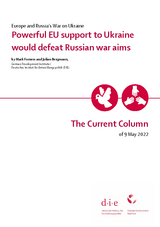Europe and Russia’s War on Ukraine
Powerful EU support to Ukraine would defeat Russian war aims
Furness, Mark / Julian BergmannThe Current Column (2022)
Bonn: German Development Institute / Deutsches Institut für Entwicklungspolitik (DIE), The Current Column of 9 May 2022
Europe Day commemorates the Schuman Declaration of 9 May 1950. It should be a day of peace and unity in the European Union. It is also the anniversary of the Nazi surrender to the Soviet Red Army in Berlin on 8/9 May 1945, marked this year in Moscow with a defiant military parade as the West condemns Russia’s war crimes in Ukraine.
The EU’s raison d’être as a successful peace project seems especially important as the war raises horrors most Europeans hoped were confined to history. The Schuman Declaration envisaged a Europe where war was not only unthinkable, but also materially impossible due to an ever-growing web of economic and political interdependencies.
Russia’s invasion of Ukraine presents the EU with a foreign policy dilemma. The EU’s primary role and strength as an international actor is in supporting peaceful cooperation via development policy, conflict prevention and peacebuilding support, trade, investments, and incentivising democratic reforms, especially in its neighbourhood.
The brutal reality is, of course, that Russia has attacked Ukraine with tanks, artillery and missiles. Russian forces have destroyed civilian infrastructure and housing. Russian politicians and state media have expressed genocidal intentions with regard to the Ukrainian population, and civilians have been deliberately targeted and murdered by Russian troops. Ukraine deserves all the military support it can get from Europe, within limits set by the need to avoid nuclear escalation.
In the short term, the EU can (and must) play a key role in strengthening Ukraine’s ability to repel the Russian invaders. The EU’s response has been fast, coherent and determined, using the full spectrum of its foreign policy tools. Through the European Peace Facility (EPF), the EU has provided financing for military equipment for Ukraine in three packages, worth EUR 1.5 billion in total.
However, the EU’s long-term geostrategic influence in its neighbourhood will not be determined by its military assistance to Ukraine. While the EU has arranged joint financing via the EPF, it is up to individual member states to organise and implement weapons deliveries to Ukraine, with political coordination at the NATO level.
The EU’s influence will be determined by how it uses the geopolitical tools where it has the potential to provide real added value: providing humanitarian crisis response, supporting Ukraine’s reconstruction, and leveraging the single market and Europe’s power of attraction to incentivise mutually beneficial economic, social and political relations with Ukraine and other neighbours. The EU’s recent decision to suspend all duties on imports from Ukraine is an important first step.
Initially, the EU should make every effort to support the humanitarian response to the crisis, the people it has displaced, and the countries where they have sought refuge. Immediate support to the reconstruction of Ukrainian cities and areas liberated from Russian occupation should also be offered. In that context, the EU could lead the multilateral effort to provide humanitarian and development aid to Ukraine, and ensure that it is the largest contributor to the World Bank’s multi-donor trust fund set up for that purpose. A concerted effort to rebuild Ukraine, for example via the proposed Ukraine Solidarity Trust Fund, would be an important signal of political commitment to the country.
The EU recently launched its ambitious ‘Global Gateway’ initiative, which proposes to raise EUR 300 billion for mutually beneficial infrastructure investments in non-EU countries and regions. Although not designed as a crisis response instrument, the Global Gateway aims at building exactly the kinds of physical, digital and economic infrastructure that can support peace, integration and sustainable development. There is scope for launching high-profile connectivity initiatives with Ukraine, which would also provide inspiration for the rest of the EU neighbourhood and beyond.
In the longer term, the EU should foster peaceful integration with Ukraine, well beyond what it is offering under the European Neighbourhood Policy. Ukraine was attacked because it wanted to turn its back on Russia’s ’sphere of influence’ and orient towards the EU. It should be given a clear and realistic perspective to transform itself from ‘neighbour’ to ‘member’.
On Europe Day 2022, as war again threatens European peace and security, it is important to remember that the EU’s power is rooted in its rejection of militarism, and the principles that underpin its peaceful international cooperation. Despite the horrors of the war in Ukraine, and the threat posed by Russia to the EU’s Eastern borders, the EU is not weak. The EU is prosperous, progressive and free. Its initial response must be to support the defeat of Russia’s illegal invasion. In time, powerful support to Ukrainian reconstruction will achieve exactly the opposite of what the Russian government wants: Ukraine’s independence and integration with the EU.



